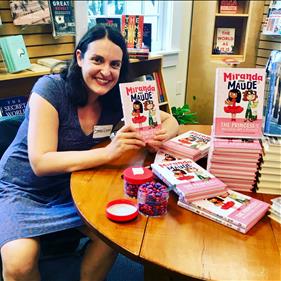Dartmouth Hillel professional publishes chapter book for children

Emma Wunsch of Dartmouth Hillel is a natural-born storyteller.
What started as a clever way to encourage her daughter to brush her teeth turned into her first-ever chapter book for children, “Miranda and Maude: The Princess and the Absolutely Not a Princess.”
Complete with illustrations by Jessika von Innerebner, the humorous tale is the first in Wunsch’s new series for early readers. The second book — “Miranda and Maude: Banana Pants!” — will be available for purchase on Feb. 5.
Wunsch recently spoke with Hillel News about “Miranda and Maude: The Princess and the Absolutely Not a Princess,” published by Amulet Books this month. Below are highlights from the conversation.
What inspired the storyline?
“My kids. When my oldest daughter was 3-years-old, she loved princesses and pink — I loved neither. One night, I told her a made-up story about a princess named Miranda Rose to try to get her to brush her teeth. It worked. A week into telling these stories, I was bored. You can only talk about tutus and castles for so long. I was missing an essential component of every good story — a plot. So, I created Maude, a girl who was the complete opposite of a Miranda. For years, I told stories about Miranda and Maude to both of my daughters. But it wasn’t until a few years ago that I put pen to paper.”
Although your book isn’t connected to Jewish life, you say it incorporates Jewish values. Can you tell us what some of those values are and how you address them in your book?
“The character of Maude is passionate about social justice and activism. She sees herself as a repairer of the world, or someone who does acts of tikkun olam. And the overall message of being kind to others is a Jewish value. You never know who you’re going to be friends with. In fact, your differences might bring you closer together.”
What do you want readers to take away from your story?
“You never know if your best friend will be one desk away. If we can teach ourselves and our children to be a little less judgmental, a little more open and realize that everybody has something going on, the world will be a more understanding place. When students interact with their peers in a classroom setting, you’re only seeing one sliver of their lives. We don’t always know what’s going on in their lives outside of the classroom.”
How does “The Princess and the Absolutely Not a Princess” address judgement and acceptance while still being an enjoyable read for young students?
“I really value the humor and the quirks in stories like this one. Those are what came to me first. I didn’t set out to write a book with a clear, take away message. I wanted to write a story about friendship — one that my own kids would enjoy reading. I think the message sort of worked its way into the story as I continued to write. I’ve read books to my girls where the message is beating you over the head. And to me, that doesn’t work. When you have an organic story with a message that’s not staring readers in the face, it adds value to your words.”
Did you learn anything new about yourself while writing this book?
“I’ve been telling these stories for years. But when I took a step back to think ‘Where did these stories originate from?’ I remembered they were inspired by my daughter’s love of princesses. I was never a fan of princesses, but I opened up to them because of her. You can say you don’t like something, but you never really know until you open your heart. Embracing what my daughter liked at that particular time in her life opened up my whole world. I think that we can be very quick to be judgmental, and that’s made me want to be as open minded as possible.”
How do your skills as a narrative storyteller help you in your role as the director of donor relations for Dartmouth Hillel?
“As the director of donor relations, I’m always looking for creative ways to tell Dartmouth Hillel’s story. This can be in the form of an e-newsletter, an annual appeal letter or something I haven’t thought of yet. I think my narrative skills help me to approach sharing Hillel’s story from a variety of perspectives. I also think my ability to write, edit and revise helps me to communicate as clearly and efficiently as possible.”